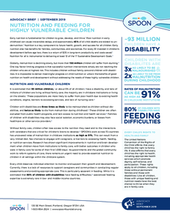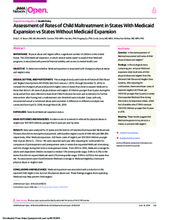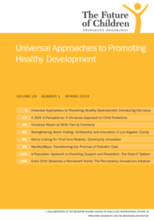Displaying 61 - 70 of 241
This advocacy brief from SPOON Foundation notes that successful nutrition interventions are not reaching the children who are at highest risk, including children without family care and children with disabilities, and outlines four key actions that can help to ensure that children without family care and children with disabilities have opportunities to grow and thrive.
The purpose of this systematic review is to synthesize existing research on community- and home-based interventions designed to improve parenting and reduce risk of maltreatment for families with substance-exposed newborns (SENs), applying a program logic framework.
The Breastfeeding Advocacy Toolkit (the Toolkit) is intended to ensure stakeholders are able to easily access and use advocacy tools aimed at improving policies and financing for the protection, promotion, and support of breastfeeding.
The purpose of this study was to describe the role of Public Health Nurses (PHN) addressing the needs of children and adolescents in foster care.
In this case study, the authors address a critical component of health care delivery for a vulnerable population by describing a process of developing an information sharing system between health care and child welfare organizations in collaboration with child protection community partners in the US.
The purpose of this study was to investigate factors influencing performance of orphans and vulnerable children Programmes in Kenya focusing on unbound project in TharakaNithi County, Kenya.
The goal of the Strategy is to ensure the U.S. Government’s investments for the most-vulnerable children and families around the world are comprehensive, coordinated, and effective in helping place partner countries on a Journey to Self-Reliance by which they can sustainably finance, manage, and deliver services that lead to stable, resilient, and prosperous families and communities.
The purpose of this study was to determine whether Medicaid expansion is associated with changes in physical abuse and neglect rates of children in the US.
In words, images, facts and figures, this report details the results that UNICEF achieved in 2018, together with its generous partners and supporters, a dedicated global workforce and children and young people themselves.
This volume explores universal social programs designed to serve entire communities as they move toward achieving population impact in reducing child maltreatment, strengthening parental capacity, and improving infant health and development.






